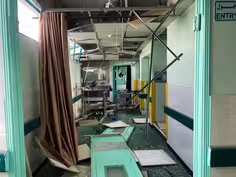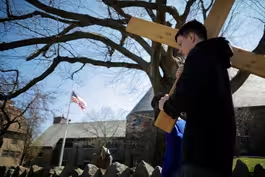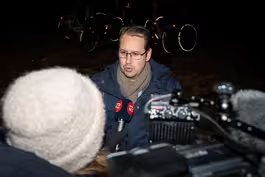
What needs to happen to pass Ukraine aid, border funding
Clip: 12/14/2023 | 5m 59sVideo has Closed Captions
What needs to happen for Congress to pass funding for Ukraine aid and border security
In a sign that a deal on border security and Ukraine funding could still emerge by Christmas, the U.S. Senate is staying in town next week instead of going on its scheduled recess. Congressional Correspondent Lisa Desjardins and White House Correspondent Laura Barrón-López discuss Thursday's developments.
Problems playing video? | Closed Captioning Feedback
Problems playing video? | Closed Captioning Feedback
Major corporate funding for the PBS News Hour is provided by BDO, BNSF, Consumer Cellular, American Cruise Lines, and Raymond James. Funding for the PBS NewsHour Weekend is provided by...

What needs to happen to pass Ukraine aid, border funding
Clip: 12/14/2023 | 5m 59sVideo has Closed Captions
In a sign that a deal on border security and Ukraine funding could still emerge by Christmas, the U.S. Senate is staying in town next week instead of going on its scheduled recess. Congressional Correspondent Lisa Desjardins and White House Correspondent Laura Barrón-López discuss Thursday's developments.
Problems playing video? | Closed Captioning Feedback
How to Watch PBS News Hour
PBS News Hour is available to stream on pbs.org and the free PBS App, available on iPhone, Apple TV, Android TV, Android smartphones, Amazon Fire TV, Amazon Fire Tablet, Roku, Samsung Smart TV, and Vizio.
Providing Support for PBS.org
Learn Moreabout PBS online sponsorshipWILLIAM BRANGHAM: In a sign that a deal on border security and Ukraine funding could still emerge by Christmas, the U.S. Senate plans to stay in town next week, instead of going on its scheduled recess.
Capitol Hill correspondent Lisa Desjardins and White House correspondent Laura Barron-Lopez are here to walk us through the latest.
Thank you both so much for being here.
Lisa, let's start with you.
How close are senators really to a deal?
And help us understand this issue that seems to be driving them so much, the numbers at the U.S.-Mexico border.
LISA DESJARDINS: Well, it is a sign that they are close that they have told senators to be ready to come back next week, but they have yet to really deal with some of the biggest differences between Republicans and Democrats.
The key, though, is that leaders on both sides want a deal.
So that's why we're watching it so closely.
Why do they want a deal?
Well, in part what we're seeing at the border.
So I want to talk about those numbers, because you see those without context.
We're a place for context.
First of all, this is the October numbers, the latest that we have.
Southwest border, we see migrant encounters about 240,000.
That is high, but it is not that different from last year's numbers.
One thing people need to know, that includes legal crossings.
So if you take the legal entries out, actually, the total illegal entry is more like 180,000.
I think it's also important to talk about who are we talking about.
The faces here are not something we focus on.
Let's look at last year, October 2022. Who was making -- who were being apprehended there at the Southwest border?
Look at that.
By far and away, it was single adults who were being picked up.
But let's look at the numbers now, October 2022, 2023, families.
You're seeing far more families now crossing the border.
They are being apprehended, the number of adults going down.
That has to do with U.S. policy.
Families are able to stay more, But it also has to do with the demand.
So, when we talk about these policies, that's who's being affected.
WILLIAM BRANGHAM: And so, Laura, these negotiations that are going on right now, what is actually on the table that's being discussed right now?
LAURA BARRON-LOPEZ: Multiple sources with knowledge of the negotiations have told me, have told Lisa that the White House is open to supporting major changes to the immigration system in this country.
Here's what's on the table, expanding fast-track deportations without judicial review to any undocumented person across the United States, if the person cannot prove they have lived here for two years.
Currently, expedited removals only apply to migrants that live within -- that are within 100 miles of the border who've arrived within 14 days.
They're also considering a new expulsion authority that would allow the administration to expel people with no ability to seek asylum.
It would be triggered if the number of arrivals exceeds more than 5,000 people a day.
Essentially, this makes permanent that Title 42 deportation policy without needing the public health crisis justification.
Negotiators are also talking about an expansion of detention for migrants.
But we don't know which migrants that would apply to, or if it would even comply with child detention laws.
Now, on that fast-track deportation, William, it's important to note that that would impact the 11-million-plus undocumented immigrants that currently live in this country, that have worked here for years, married here, have children here.
And they would need to carry on their person if something like this actually became law gym memberships, bills, any type of identification constantly with them that could show that they have lived here for more than two years.
And that new expulsion authority would essentially be eliminating asylum as it's currently written under our law.
WILLIAM BRANGHAM: Lisa, I know you have been talking to Republicans across the ideological spectrum.
How do they see these proposals that Laura's laying out?
LISA DESJARDINS: Well, this is a divided party, so there are different.
But, in general, it's important to understand that Republicans, most of them want what's called a closed border.
It's important to talk about what that means, because this is where the policy that Laura just talks about comes into play.
Republicans I talk to you, by and large, want asylum seekers who now can come and then be left to enter this country while they await processing, they want most of those asylum seekers to either be denied right away or to be in detention.
And that includes family detention.
Now, this is sort of an enforcement approach, and that's where you see some divide.
There are some on the sort of center-right, including a group called the National Immigration Forum that says enforcement only is not going to work.
We still need workers.
We are Republicans, and we want people to be able to have a legal process, because we have a labor shortage.
They think this might go too far.
But there are others on the other side, like the House Freedom Caucus, who say, this doesn't go far enough.
And they're worried that this isn't a total closure of the border.
So, in general, Republicans want this closed border, and this negotiation has moved closer that direction.
WILLIAM BRANGHAM: And, Laura, what do the Democrats say about all of this?
LAURA BARRON-LOPEZ: So, I spoke to multiple former Biden administration officials who say that they're demoralized, they're disillusioned, they're disappointed, that they can't believe that the White House is even entertaining something like this, when they may not get anything in exchange, like a pathway to citizenship for dreamers.
And I think it's important to note, William, that the primary reason that these major immigration changes are being talked about is because a growing faction of House Republicans have repeatedly said that they will not support any additional Ukraine funding unless there are more severe restrictions on asylum and on undocumented migrants.
Now, former officials and Democrats across the spectrum that I have talked to say that they think that, even if this ultimately passes the Senate, that, even if there is a deal between Senate negotiators and the White House, that this could ultimately get tanked in the House, because they think that there could be enough House Democrats and enough House Republicans, for vastly different reasons, that will not go along with this.
WILLIAM BRANGHAM: It's such an incredibly complicated maze, you guys.
LISA DESJARDINS: It is.
WILLIAM BRANGHAM: Laura Barron-Lopez, Lisa Desjardins, thank you for helping us get through it all.
LISA DESJARDINS: You're welcome.
LAURA BARRON-LOPEZ: Thank you.
Gaza civilians face new threat with spread of disease
Video has Closed Captions
Clip: 12/14/2023 | 5m 55s | Gaza civilians caught in crossfire face new threat with spread of deadly diseases (5m 55s)
How some evangelicals are combating political radicalization
Video has Closed Captions
Clip: 12/14/2023 | 8m 4s | How some evangelical leaders are combating political radicalization in their congregations (8m 4s)
Israel says war will continue 'more than several months'
Video has Closed Captions
Clip: 12/14/2023 | 3m 14s | Israel says Gaza war will continue 'more than several months' amid pressure for cease-fire (3m 14s)
News Wrap: Authorities arrest 7 accused of plotting attack
Video has Closed Captions
Clip: 12/14/2023 | 3m 25s | News Wrap: Authorities arrest 7 accused of plotting Europe terror attack (3m 25s)
Putin vows to press on with Ukraine invasion despite losses
Video has Closed Captions
Clip: 12/14/2023 | 9m 4s | Putin vows to press on with Ukraine invasion despite heavy Russian losses (9m 4s)
Real estate commission challenges could shake housing market
Video has Closed Captions
Clip: 12/14/2023 | 8m 49s | Lawsuits challenging real estate commission could shake up housing market (8m 49s)
Rush's Geddy Lee reflects on music and life in new memoir
Video has Closed Captions
Clip: 12/14/2023 | 7m 24s | Rush frontman Geddy Lee reflects on his music and life in a new memoir (7m 24s)
Providing Support for PBS.org
Learn Moreabout PBS online sponsorshipSupport for PBS provided by:
Major corporate funding for the PBS News Hour is provided by BDO, BNSF, Consumer Cellular, American Cruise Lines, and Raymond James. Funding for the PBS NewsHour Weekend is provided by...


















